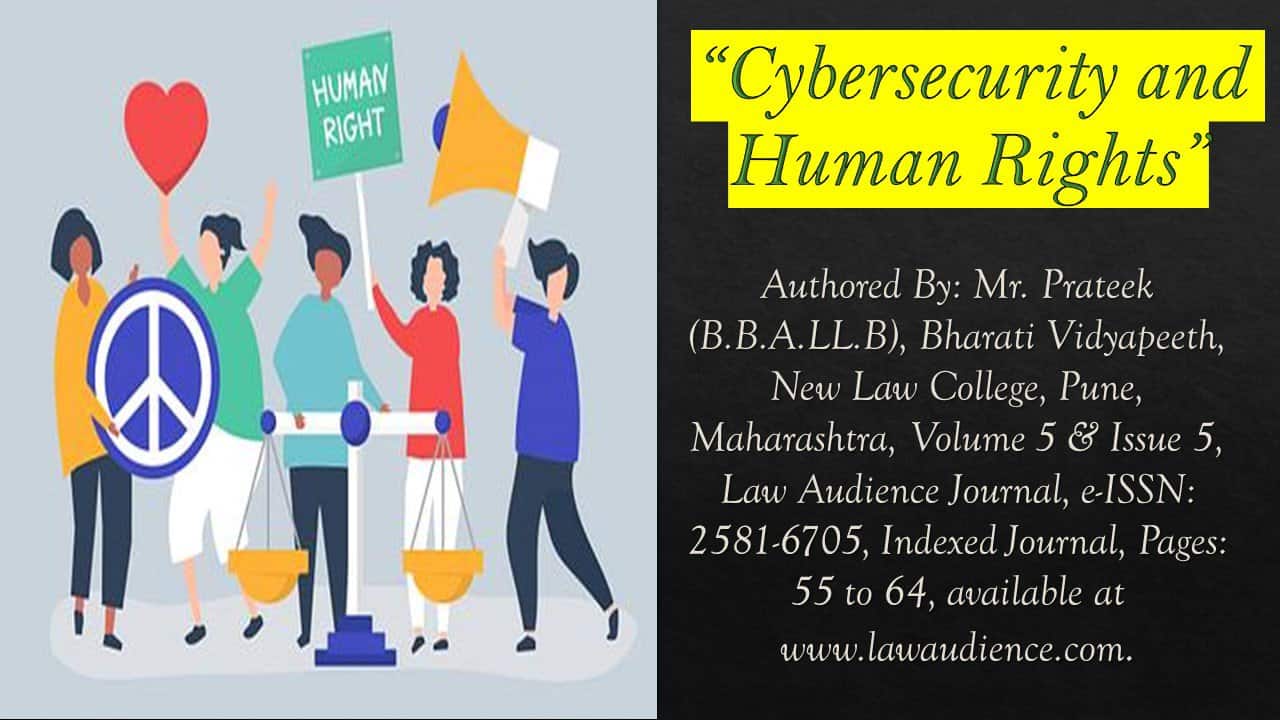Click here to download the full paper (PDF)
Authored By: Mr. Prateek (B.B.A.LL.B), Bharati Vidyapeeth, New Law College, Pune, Maharashtra,
Click here for Copyright Policy.
ABSTRACT
“The swift advancement of technology and the growing interconnection of the world’s population have presented previously unheard-of cybersecurity issues, requiring a careful balancing act between the protection of digital landscapes and fundamental human rights. The complex interrelationship between cybersecurity precautions and human rights protection is examined in this research paper, emphasising the necessity of peaceful cohabitation between these two fields. Concerns over the possible erosion of individual privacy, freedom of expression, and other fundamental rights have been voiced in recent years due to the rise of cyber dangers. As governments and organisations implement strong cybersecurity defences against these threats, concerns are raised about possible violations of individual rights. For legislators, engineers, and human rights advocates alike, striking the correct balance between cybersecurity imperatives and the protection of human rights has become crucial”.
Keywords:
Cybersecurity, Human Rights, Privacy, Freedom of Speech and Expression, Digital Era.
I. INTRODUCTION:
Cybersecurity is the preservation of the availability, confidentiality, and integrity of information and its underlying infrastructure. It involves protecting the information we share and maintain online, including communications, financial information, medical records, proprietary data, and more, Human rights in the context of cybersecurity refers to the rights that can be affected by cybersecurity practices. These include the right to privacy, freedom of expression, and the free flow of information. The intersection of cybersecurity and human rights arises because cybersecurity threats can have a direct impact on human rights for instance, network shutdowns can restrict access to information and the ability of people to express themselves, peacefully assemble and associate. Data breaches and mass government surveillance can violate the right to privacy. Therefore, a human rights-based approach to cybersecurity means putting people at the centre and ensuring that there is trust and security in networks and devices that reinforce, rather than threaten, human security This approach addresses digital human rights violations, Internet freedom, and privacy of data. [1]
II. CYBERSECURITY: PRINCIPLES AND DIFFICULTIES:
Cybersecurity refers to the methods and procedures used to guard against theft, damage, and unauthorised access to computer systems, networks, and data. In the current digital era, when technology is ingrained in every aspect of our lives, it is an essential field.
The notion of cybersecurity encompasses several elements, including:
1) Confidentiality: Making sure that only authorised people or systems have access to sensitive information.
2) Integrity: Preventing unauthorised alteration or tampering to preserve data’s correctness and reliability.
3) Availability: Making certain that data and systems are shielded from interruptions and are available when needed.
4) Complexity of Technology: The complexity of technology and the increasing use of interconnected devices and networks make it difficult to ensure comprehensive cybersecurity. 5) Limited Resources: Many organizations have limited resources to invest in cybersecurity, making it challenging to implement effective cybersecurity measures.
6) Insider Threats: Insider threats, such as employees with malicious intent or negligence, can pose a significant cybersecurity risk.
III. HUMAN RIGHTS AND FUNDAMENTAL FREEDOMS ON THE INTERNET:
A significant feature of the digital era is the internet’s ability to protect fundamental freedoms and human rights. The internet has developed into a crucial medium for expression, communication, and information access. Therefore, it is imperative to guarantee the protection of fundamental liberties and rights in the online sphere.
Several fundamental ideas concerning online human rights include:
- Freedom of expression: This right ensures that people may freely express their views, opinions, and thoughts online without facing restrictions or fear of retaliation.
- Right to privacy: People are entitled to the protection of their personal data online and to their own space. Protecting against data breaches, spying, and illegal access to personal information are all included in this.
- Information access: Regardless of geography or socioeconomic background, everyone should have equal and unfettered access to the knowledge and information that is available online.
- Digital inclusion: ensuring that everyone has access to digital technology and the internet, closing the digital gap, and fostering digital skills and literacy.
- Protection from cybercrime: People need to be shielded against identity theft, cyberbullying, and other types of online abuse.
- Net neutrality: The idea that internet service providers shouldn’t discriminate against or give any treatment to any kind of online traffic.
Governments, groups, and people must cooperate to protect these freedoms and rights on the internet and to resolve any issues or infractions that may occur. [2]
IV. HUMAN RIGHTS AND CYBERSECURITY: THEIR INTERACTION:
The fields of cybersecurity and human rights are intricately related. Cybersecurity precautions are necessary, on the one hand, to safeguard people’s liberties and rights online. However, human rights should not be violated or obstructed using cybersecurity measures. Let’s investigate this link in more detail:
- Right to privacy: Cybersecurity efforts are designed to safeguard people’s online privacy and personal data. Safeguarding this right requires the use of encryption, secure communication channels, and data protection procedures. A balance between security and privacy must be struck, though, as overzealous surveillance or intrusive tactics may violate people’s right to private.
- Freedom of expression: The deployment of cybersecurity measures as a means of stifling or restricting speech is not appropriate. While preventing cyberthreats like cybercrime and disinformation is vital, any limitations on online expression and content must be reasonable, essential, and respectful of people’s right to free speech.
- Information access: People should be able to obtain information and knowledge from the internet without being hindered by cybersecurity precautions. Website blocking, content filtering, and censorship ought to be applied sparingly and in compliance with international human rights norms.
- Due process and rule of law: When addressing cybersecurity threats, it is crucial to ensure that legal frameworks and due process are followed. Any actions taken to investigate cybercrimes or protect online security should be in line with the rule of law, respecting individuals’ right to a fair trial and the presumption of innocence.
- Transparency and accountability: Governments and organizations involved in cybersecurity should be transparent about their practices, policies, and the collection and use of individuals’ data. Accountability mechanisms should be in place to address any abuses or violations of human rights in the context of cybersecurity. [3]
V. HUMAN RIGHTS CONCERNS ABOUT CYBERSECURITY:
Civil society advocates and others have come to realise that broad and comprehensive cybersecurity rules and principles have a harmful influence on human rights, despite the fact that certain national and international legislation make an effort to incorporate human rights issues while creating cybersecurity standards. When we discuss human rights, we primarily refer to those rights protected by the International Covenant on Civil and Political Rights (ICCPR) and the Universal Declaration of Human Rights (UDHR), such as the right to privacy, the freedom of speech, and the right to freedom of expression. One of every person’s most fundamental rights is the freedom of association and opinion.
VI. EXAMPLES OF CYBERSECURITY THAT MEASURES HUMAN RIGHTS:
There are several examples of cybersecurity measures that respect and uphold Human Rights. Here are some examples.
- Encryption: Encryption is a basic cybersecurity measure that safeguards the integrity and confidentiality of personal data and communications. Organisations can guarantee the privacy of individuals and the security of their sensitive data by implementing robust encryption standards. Encryption respects people’s right to privacy while enabling secure communication methods.
- Access controls and authentication: Protecting people’s data and systems from unwanted access is made easier by putting strong access controls and authentication procedures in place. Organisations may guarantee that only authorised persons have access to critical information by using user access management, multi-factor authentication, and strong passwords. This approach safeguards people’s data from unauthorised use while respecting their right to privacy.
- Incident response and data breach notification: It’s critical to have well defined procedures for both types of situations. When a cybersecurity incident or data breach occurs, companies need to act quickly and openly. This include telling those who are impacted about the breach, giving advice on safety precautions, and extending support. Such actions assist people in reducing potential harm and show respect for their right to information.
- Privacy by design: One important cybersecurity solution that upholds human rights is to include privacy considerations in the design and development of systems and services. Organisations can give individuals’ privacy rights priority right from the start by putting in place privacy-enhancing technologies, data minimization strategies, and privacy impact assessments. This method guarantees that cybersecurity procedures respect people’s right to privacy and are in line with privacy principles.
VII. CYBER CRIMES AS HUMAN RIGHTS VIOLATIONS:
At the point when anyone carrying out the crimes utilizing Internet and Computer is known as a cybercrime. In Indian constitution under article 21, right to privacy is the part of basic rights. If anybody is carrying out the crime utilizing some electronic media, then it is specifically violations of human rights. There are such many things to keep protected from others access to characterize the limits of somebody’s data. Subsequently unapproved access of this data is at last violations of human rights which ought to be ensured as other crucial rights are secured. Cybercrime can also have a chilling effect on individuals’ exercise of their human rights, such as freedom of expression, access to information, and privacy. For example, when governments engage in online surveillance, it can create a climate of fear and self-censorship, leading to a restriction of free speech and other human rights. Moreover, cybercrime can disproportionately affect marginalized and vulnerable groups, such as women, children, LGBTQ+ individuals, and persons with disabilities. [4] These groups may be more susceptible to cybercrime due to cyber bullying, online harassment, and other forms of online abuse. Therefore, it is essential to recognize cybercrime as a violation of human rights and take measures to prevent and address it. This includes strengthening legal frameworks and law enforcement measures to hold perpetrators accountable, providing support to victims, and promoting public awareness and education on cyber safety and digital literacy. Efforts are underway globally to address the intersection of cybercrimes and human rights. International organizations, governments, and civil society are working to establish norms, laws, and mechanisms to protect individuals online. Balancing the need for cybersecurity with the protection of human rights remains a complex challenge in the digital age.
VIII. LAWS TO PROTECT HUMAN RIGHTS IN CYBERSPACE:
- Indian Law on Protection of Right to Privacy: In India, there are three international treaties that are widely recognized as the basis for the protection of Privacy. Those are Article -12 of the Universal Declaration of Human Rights, 1948, Article -17 of the International Covenant on Civil and Political Rights (ICCPR) [5]
- International Human Rights Law (IHRL): IHRL also applies to State conduct in cyberspace. Under IHRL, States have obligations to protect relevant human rights of individuals under their jurisdiction, including the right to privacy, where those rights are exercised or realized through or in cyberspace [6]
- Cybersecurity Laws: These laws have a direct impact on human rights, particularly the right to privacy, freedom of expression, and the free flow of information [7]
- Article 19 (3) of the ICCPR: This clause provides that the exercise of the right carries with its special duties and responsibilities. It may therefore be subjected to certain restrictions, but these shall only be such as are provided by law and are necessary for respect of the rights or reputations of others; for the protection of national security or of public order, or of public health and morals [8]
- International Covenant on Civil and Political Rights (ICCPR): The United Nations Human Rights Council (UNHRC) has stated that the freedoms of expression and information under Article 19 (2) of the ICCPR include the freedom to receive and communicate information, ideas, and opinions through the Internet [9]
IX. THE DIGITAL ERA AND HUMAN RIGHTS:
In the digital era, human rights pertain to the utilisation and safeguarding of essential human rights within the framework of digital technologies and virtual spaces. The advancement of technology has created both new opportunities and obstacles for the exercise of human rights.
Key aspects related to human rights in the digital age:
- Freedom of Expression: The internet has expanded the avenues for individuals to express their opinions and access information. However, restrictions on online speech and censorship remain concerns in many parts of the world.
- Privacy: The collection, use, and storage of personal data by governments and private entities raise concerns about privacy. Surveillance practices, data breaches, and lack of control over personal information are significant challenges.
- Access to Information: The internet has the potential to democratize access to information, empowering individuals to seek and share knowledge. However, the digital divide, censorship, and restrictions on access hinder universal access to information.
- Digital Security: It’s critical to safeguard people’s online safety and digital security. Identity theft, cyberattacks, and online abuse are risks to people’s safety and can restrict their ability to exercise their rights.
- Digital Divide: Those who are marginalised or lack resources have less opportunities due to the unequal access to digital technologies and internet connectivity, which creates an uneven playing field. It is imperative to close the digital divide to provide equitable access to information and participation.
- Online Human Rights Activism: Digital technologies have provided new avenues for human rights activism, enabling individuals and organizations to advocate for change and raise awareness globally. However, activists also face risks of surveillance, harassment, and censorship. To address human rights in the digital age, it is essential to establish legal frameworks that protect individuals’ rights online, ensure transparency and accountability in digital practices, promote digital literacy, and bridge the digital divide. International cooperation, multi – stakeholder engagement and ethical considerations in the development and deployment of digital technologies are vital to safeguard human rights in the evolving digital landscape. [10]
X. CONCLUSION:
In conclusion, cybersecurity and human rights are interconnected and must be approached in a balanced and mutually reinforcing manner. While cybersecurity measures are necessary to protect individuals and organizations from cyber threats, it is crucial to implement these measures in a way that respects and upholds human rights. Respecting human rights in the realm of cybersecurity means safeguarding individuals’ right to privacy, freedom of expression, access to information, due process, and accountability. It involves striking a balance between security and privacy, ensuring that surveillance and data collection are proportionate, necessary, and in compliance with legal frameworks. Examples of cybersecurity measures that respect human rights include encryption, access controls and authentication, vulnerability management, incident response and data breach notification and privacy by design. These measures prioritize individuals’ privacy, security, and informed decision-making. A human right- cantered approach to cybersecurity requires collaboration between governments, organizations, and civil society. It involves promoting transparency, accountability, and adherence to the rule of law in cybersecurity practices. It also necessitates continuous review and adaptation of cybersecurity measures to address emerging threats while respecting human rights principles. By integrating human rights considerations into cybersecurity strategies, we can create a safe and secure digital environment that upholds fundamental rights and freedoms. This approach ensures that individuals can enjoy the benefits of the digital age while being protected from cyber threats and potential abuses.
Cite this article as:
Mr. Prateek, “Cybersecurity and Human Rights”, Vol.5 & Issue 5, Law Audience Journal (e-ISSN: 2581-6705), Pages 55 to 64 (26th March 2024), available at https://www.lawaudience.com/cybersecurity-and-human-rights.
References:
- Why cybersecurity is a human rights issue, and it is time to start treating it like one | Association for Progressive Communications (apc.org)
- Human Rights for Internet Users – Freedom of Expression (coe.int)
- Will Cyber security and cybercrimes make impact on Human Rights? – E-Justice India (ejusticeindia.com)
- Human rights in cyberspace – Wikipedia
- Cybersecurity and Human Rights – Public Knowledge
- International human rights law – International cyber law: interactive toolkit (ccdcoe.org)
- A Study of Indian Law on Protection of Right to Privacy In The Cyber World (legalserviceindia.com)
- Why cybersecurity is a human rights issue, and it is time to start treating it like one | Association for Progressive Communications (apc.org)
- pdf (unhabitat.org)



